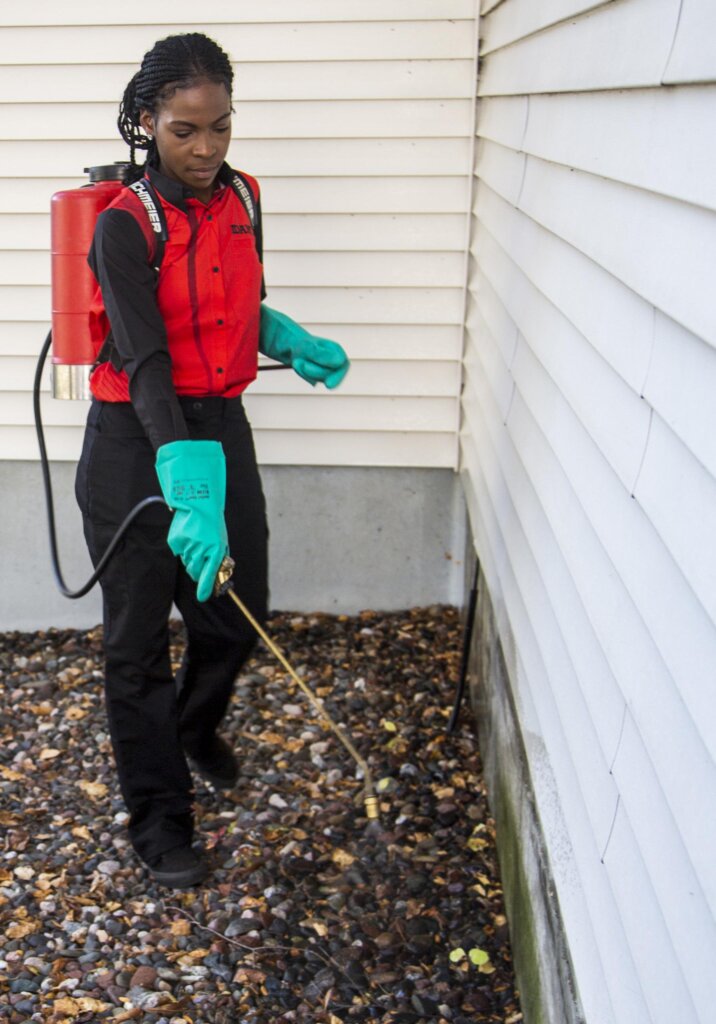Experienced A1 Exterminators Charlotte NC - Quick and Trusted Solutions
Experienced A1 Exterminators Charlotte NC - Quick and Trusted Solutions
Blog Article
Bed Bug Therapy Malfunction: Comparing Chemical Vs. Non-Chemical Solutions
In the realm of bug control, particularly when dealing with the consistent issue of bed bugs, the choice in between chemical and non-chemical treatment remedies can be a critical one. Both approaches provide distinctive advantages and downsides, influencing elements such as efficiency, safety factors to consider, and overall price. By analyzing the nuanced details of each method, a more clear understanding of which course to go after in resolving a bed insect infestation can be obtained.
Effectiveness of Chemical Treatments
Chemical therapies for bed insect infestations have actually been extensively recognized for their potent and quick efficacy in removing these parasites. When taking into consideration the efficiency of chemical treatments, it is important to recognize that they can offer a thorough and quick option to a bed pest problem. Specialist pest control operators frequently rely upon pesticides to target bed pests at various phases of their life process, consisting of nymphs, grownups, and eggs. These chemicals normally function by disrupting the bed bugs' nerve system, resulting in paralysis and ultimate fatality.
Furthermore, chemical therapies have the advantage of providing residual results, implying that they can remain to eliminate bed bugs also after the first application. This residual action is particularly advantageous in combating any possible re-infestations. Additionally, the fast action of chemical therapies can bring alleviation to individuals facing serious bed insect infestations, permitting them to gain back control of their home quickly.
Safety And Security Worries With Chemical Solutions
One crucial aspect that requires cautious consideration when using chemical services for bed bug treatment is making sure the safety and security of passengers and the atmosphere. Exposure to certain chemicals used in bed insect therapies can lead to respiratory system concerns, skin irritation, or various other damaging responses, particularly in individuals with pre-existing conditions or level of sensitivities.
Furthermore, the ecological effect of chemical services is another substantial factor to consider. Some chemicals used in bed insect therapies may be damaging to useful insects, wild animals, and environments if they seep into the dirt or water systems. It is important to make use of chemical treatments judiciously, adhering to security guidelines, and taking into consideration less harmful alternatives to minimize these dangers and ensure the reliable and safe monitoring of bed insect problems.
Benefits of Non-Chemical Approaches
Thinking about the potential security concerns and ecological influence linked with chemical options for bed bug treatment, discovering non-chemical strategies offers a promising option with numerous distinct advantages. Non-chemical methods supply a much safer alternative for households, particularly those with children, individuals, or family pets sensitive to rough chemicals. These methods remove the threats of exposure to harmful compounds, minimizing the potential for negative wellness results. Furthermore, non-chemical treatments are eco-friendly, as they do not add to air or water pollution, making them a sustainable choice for insect control.
Furthermore, non-chemical services can be efficient in A1 exterminator charlotte nc targeting bed bugs, including hard-to-reach locations where chemical treatments might not pass through. Approaches such as heat treatment, vacuuming, vapor cleansing, and bed mattress encasements offer comprehensive obliteration without the usage of dangerous chemicals. Additionally, non-chemical approaches can be less turbulent, calling for marginal preparation and enabling quicker reentry right into treated areas. In general, selecting non-chemical bed bug therapy methods not just focuses on safety and environmental management however likewise ensures comprehensive and efficient parasite control.
Limitations of Non-Chemical Treatments

Additionally, non-chemical therapies commonly require several applications to accomplish successful obliteration. This can be lengthy and may not constantly assure full elimination of all bed pests and their eggs, especially in hard-to-reach or covert areas.
Moreover, the success of non-chemical treatments greatly depends on correct application and thoroughness, which can be testing for individuals without professional experience. Insufficient application of non-chemical methods may cause insufficient obliteration, resulting in relentless infestations and the demand for additional treatments.
Consequently, while non-chemical treatments have their benefits, it is necessary to recognize these limitations and consider them when identifying the most efficient strategy for managing bed insect problems.
Expense Comparison: Chemical Vs. Non-Chemical Options
Given the restrictions linked with non-chemical therapies, a necessary element to assess in the context of bed bug management is the expense comparison in between chemical and non-chemical alternatives. In contrast, non-chemical therapies like warmth therapy or vapor can be a lot more costly, with costs varying from $1,000 to $6,000 for an entire home. While the preliminary expense of chemical treatments might seem reduced, several treatments may be required to totally eliminate the infestation, possibly increasing the general expense.
Conclusion

Considering the possible security concerns and ecological impact linked with chemical options for bed insect treatment, discovering non-chemical techniques presents an appealing alternative with numerous unique advantages.Provided the constraints connected with non-chemical therapies, an essential facet to examine in the context of bed bug monitoring is the cost comparison in between chemical and non-chemical choices. In contrast, non-chemical therapies like heat therapy or steam can be extra pricey, with expenses varying from $1,000 to $6,000 for an entire home. While the preliminary cost of chemical therapies may seem reduced, multiple therapies might be required to totally eliminate the problem, potentially enhancing the total price.In final thought, when comparing chemical and non-chemical bed bug therapy options, it is necessary to consider performance, safety, benefits, restrictions, and price.
Report this page